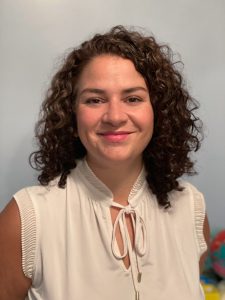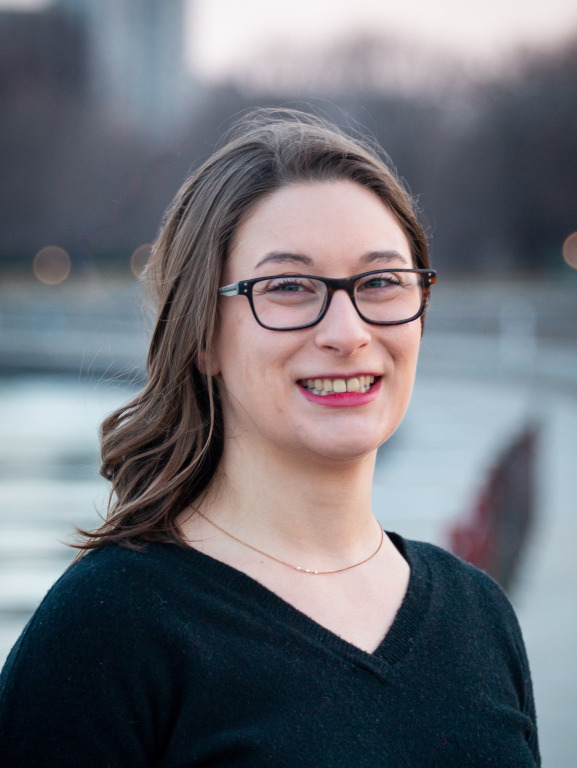Editor’s note: this month’s Notes from the Executive Director is a collaboration with Biz Gallo, Rick Adler, and Chelsea Denault, and serves as a chance to introduce our readers to some people and projects making a difference in libraries in Michigan. Read on to learn more about Biz, Rick, and Chelsea.
Caring for and providing access to digital collections is not a new challenge for libraries – the American Library Association and others have been providing guidance on digital collections stewardship for well over a decade – but knowing where and how to start planning for robust digital materials can be daunting. Good digital collections management has many elements and often requires specialized knowledge and vocabulary. What’s the best way for institutions to start on this important path without feeling like they need to make the journey alone?
Many in Indiana will be familiar with Indiana Digital Preservation, or InDiPres, Indiana Memory, and the fact that Indiana Memory also serves as a Digital Public Library of America (DPLA) Service Hub. This month, we’ll focus in this space on three resources to help libraries and other cultural heritage organizations in Michigan create, protect, and share their digital assets.
Biz Gallo began work in June as the Statewide Digitization Initiatives Coordinator at the Library of Michigan. Biz works with libraries, museums, and other cultural heritage organizations across the state to plan for and implement digitization projects. Rick Adler is the Coordinator of the Michigan Service Hub, part of the nationwide hub network that works with the Digital Public Library of America to provide public access to digital holdings. Chelsea Denault is the Coordinator of the Michigan Digital Preservation Network. She also works with a wide range of cultural institutions across the state to protect digital collections from technology failure, human error, natural disasters, ransomware, and other threats.
The work that Biz, Rick, and Chelsea each do comes together like a three-legged stool: all three legs of the stool are necessary in order for it to remain stable and upright, but each leg does one-third of the work. In this way, each leg is important and unique, but can only hold up the stool alongside the other two. This month, the three of them will share more about what they do, their goals for the future, and how they plan to work together to create new solutions for institutions of all sizes and budgets.
– –
 My name is Biz Gallo (she/her/hers) and I am thrilled to be stepping into the newly created role of Statewide Digitization Initiatives Coordinator! I have spent the past eight years working as a digitization consultant in the private sector, focusing on audiovisual preservation and reformatting. This position, which highlights the State of Michigan’s continued dedication to creating access to the story of the state, strives to provide consultation on digitization of materials to libraries and cultural heritage organizations throughout Michigan.
My name is Biz Gallo (she/her/hers) and I am thrilled to be stepping into the newly created role of Statewide Digitization Initiatives Coordinator! I have spent the past eight years working as a digitization consultant in the private sector, focusing on audiovisual preservation and reformatting. This position, which highlights the State of Michigan’s continued dedication to creating access to the story of the state, strives to provide consultation on digitization of materials to libraries and cultural heritage organizations throughout Michigan.
My goal is to create a thriving digitization ecosystem by providing the necessary resources, whether in the form of expertise, equipment, or funding. I am looking forward to hearing from stakeholders throughout the state’s cultural heritage institutions to discover what I can do for them. There are many programs in development already, but hearing from you directly about what your needs are, and how I can meet those needs, will help get us off to a great start! Currently, there are plans for the creation of circulating digitization kits, installation of large-scale digitization hubs, increased funding for digitization projects, and improved access to Michigan’s cultural heritage records. There will be a survey distributed this fall to gather data about Michigan’s current digitization landscape, but please don’t hesitate to reach out to me directly if you have a need for digitization-focused consulting!
– –
 I’m Rick Adler (he/him/his), Coordinator of the Michigan Service Hub (MSH). The MSH helps cultural institutions throughout Michigan broaden public access to their online collections by sharing them with the Digital Public Library of America and our own website, Michigan Memories. The MSH is a collaborative project under the direction of the Library of Michigan, University of Michigan-Ann Arbor, Michigan State University, Wayne State University, Western Michigan University, and the Midwest Collaborative for Library Services. The MSH reached a major milestone this summer, with over one million records shared with the DPLA: photographs, diaries, letters, and other materials curated by libraries, archives, museums, and historical societies throughout the state. Any institution in Michigan that makes records publicly accessible online can participate, and we welcome collection topics about every aspect of human experience – not just those directly related to Michigan, or even the United States.
I’m Rick Adler (he/him/his), Coordinator of the Michigan Service Hub (MSH). The MSH helps cultural institutions throughout Michigan broaden public access to their online collections by sharing them with the Digital Public Library of America and our own website, Michigan Memories. The MSH is a collaborative project under the direction of the Library of Michigan, University of Michigan-Ann Arbor, Michigan State University, Wayne State University, Western Michigan University, and the Midwest Collaborative for Library Services. The MSH reached a major milestone this summer, with over one million records shared with the DPLA: photographs, diaries, letters, and other materials curated by libraries, archives, museums, and historical societies throughout the state. Any institution in Michigan that makes records publicly accessible online can participate, and we welcome collection topics about every aspect of human experience – not just those directly related to Michigan, or even the United States.
Michigan Memories and the DPLA are free and open resources for the public. Cultural institutions that share their records will be included when a user uses either site to search a topic. But there is an added benefit: we only share collection metadata, not digital objects themselves. If a user, looking through the results of a search, wants to look at a particular record in full they will be sent to the website of the institution sharing it, so the institution will also get more traffic for its site. This approach also allows us to respect any donor agreements and copyright considerations for that record.
– –
 I’m Chelsea Denault (she/her/hers), the Coordinator of the Michigan Digital Preservation Network. Before my time leading the MDPN, I worked as a public historian in Chicago leading archival and outreach projects for museums and historical societies throughout the city, while also completing my Ph.D. in American History. You may have already heard of me and the MDPN here in previous communication from Scott, and I’m excited to share an update about our recent work and a peek at what we have in store over the coming months. First though, a quick primer on digital preservation and how it complements the work that Biz and Rick do. Digital preservation is a series of managed activities that ensure continued access to and usability of digital materials, whether created during digitization or acquired as born-digital content, for as long as possible. In this way, my work in the MDPN makes sure that the digital resources created through Biz’s efforts and shared with the public via Rick’s work are kept safe and remain unaltered. Considering and including preservation from the beginning of any digital collection project or program protects an institution’s investment of time and money in creating digital resources. Organizations that already manage digital content can reach out to me for help planning for or implementing a digital preservation strategy. I’m also happy to help share information about digital preservation purpose and practice to organizations hoping to learn more and plan for the future.
I’m Chelsea Denault (she/her/hers), the Coordinator of the Michigan Digital Preservation Network. Before my time leading the MDPN, I worked as a public historian in Chicago leading archival and outreach projects for museums and historical societies throughout the city, while also completing my Ph.D. in American History. You may have already heard of me and the MDPN here in previous communication from Scott, and I’m excited to share an update about our recent work and a peek at what we have in store over the coming months. First though, a quick primer on digital preservation and how it complements the work that Biz and Rick do. Digital preservation is a series of managed activities that ensure continued access to and usability of digital materials, whether created during digitization or acquired as born-digital content, for as long as possible. In this way, my work in the MDPN makes sure that the digital resources created through Biz’s efforts and shared with the public via Rick’s work are kept safe and remain unaltered. Considering and including preservation from the beginning of any digital collection project or program protects an institution’s investment of time and money in creating digital resources. Organizations that already manage digital content can reach out to me for help planning for or implementing a digital preservation strategy. I’m also happy to help share information about digital preservation purpose and practice to organizations hoping to learn more and plan for the future.
The past year has been one of great progress and accomplishment for the MDPN. We worked with our Advisory Committee on visioning and strategic planning projects, convened three new subcommittees – Membership, Technology, and Governance – to implement aspects of our strategic plan, built a new website, completed a pilot of the LOCKSS 2.0 system with our partners at Western Michigan University, hosted our first member summit featuring presentations from digital preservation experts across the country, and welcomed our first four Anchor members (Grand Valley State University, Michigan State University, University of Michigan-Ann Arbor, and Western Michigan University) to the Network. Looking to the future, we intend to have our two preservation systems, based on Wasabi Cloud Storage and LOCKSS 2.0, fully operational and ready for use by members. We’ll also have a new set of technical policies and governance documents available on our website. Finally, we’re looking forward to expanding our membership, hosting more events, and continuing our work to build a community of digital preservation knowledge and expertise across the state.
– –



